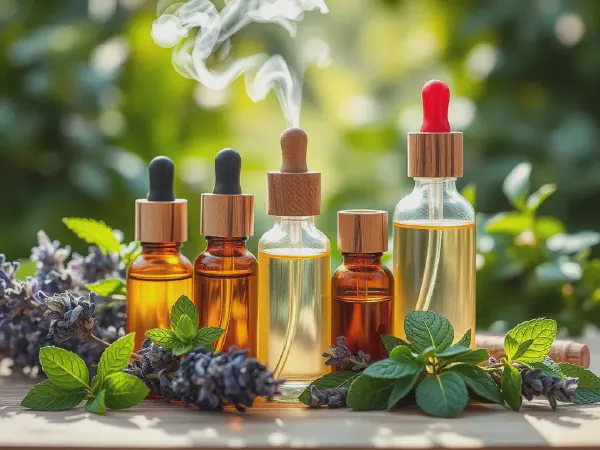Discover Therapeutic Essential Oils for a Healthier Lifestyle

The Healing Power of Therapeutic Essential Oils
Therapeutic Essential Oils have been utilized for centuries, revered for their healing properties and aromatic qualities. These concentrated plant extracts are renowned for promoting physical, emotional, and spiritual well-being. The process of extracting essential oils from various parts of plants, including flowers, leaves, bark, and roots, captures the essence of the plant, making them powerful tools in natural healing practices.
Exploring the benefits of Therapeutic essential oils can significantly enhance your overall well-being and relaxation.
In the modern world, the resurgence of interest in natural remedies has brought Therapeutic Essential Oils back into the spotlight. With their versatile applications ranging from aromatherapy to skincare, these oils have established themselves as integral components of holistic health and wellness. Their aromatic and therapeutic properties not only help in alleviating various ailments but also enhance overall quality of life by fostering a sense of peace and relaxation.
Therapeutic Essential Oils can be categorized based on their benefits and applications. Some oils are known for their calming and soothing effects, while others may provide invigorating and uplifting sensations. Whether used individually or in blends, these oils can serve a multitude of purposes—ranging from reducing stress and anxiety to promoting deeper sleep and aiding digestion. As awareness of their myriad benefits grows, more people are turning to these natural alternatives for health supplementation.
Incorporating Therapeutic Essential Oils into daily routines not only elevates one's wellness journey but also allows for a more natural lifestyle. From self-care practices to household cleaning, their utility knows no bounds. It’s essential, however, to understand the correct application methods, dosage, and safety guidelines to maximize their benefits while minimizing any potential risks associated with their use.
Through education and exploration, individuals can harness the incredible power of Therapeutic Essential Oils to create personalized wellness practices that resonate with their unique needs, allowing them to thrive in both body and mind.
Benefits of Therapeutic Essential Oils
One of the primary benefits of Therapeutic Essential Oils lies in their ability to alleviate stress and promote relaxation. Oils like lavender and chamomile are known for their calming effects, helping to reduce anxiety, improve mood, and enhance overall emotional balance. Inhaling these aromatic compounds can signal the body to release tension, fostering a more peaceful and centered state of being.
Aromatherapy, a popular practice using essential oils, has gained recognition for its positive impact on mental health. By diffusing Therapeutic Essential Oils in living spaces, individuals can create soothing environments that aid in mental clarity and emotional stability. The scent of these oils can trigger the brain’s limbic system, which is involved in mood regulation, thus allowing users to experience a more harmonious mental state through natural olfactory therapy.
Therapeutic Essential Oils also provide various physical health benefits, particularly when it comes to boosting immunity. Oils such as tea tree and eucalyptus have antiviral and antibacterial properties that can help fend off infections and support overall health. Incorporating these oils into daily routines can bolster the immune system, enhancing one’s defenses against common ailments and promoting vitality.
Additionally, certain Therapeutic Essential Oils are effective in pain management. Oils like peppermint and ginger are known for their analgesic properties and can alleviate muscle soreness, headaches, and joint pain when applied topically or inhaled. These natural remedies offer a safe and holistic approach to managing discomfort, promoting a better quality of life without reliance on pharmaceuticals.
Popular Types of Essential Oils
Lavender essential oil is one of the most popular and widely used Therapeutic Essential Oils due to its remarkable ability to promote sleep and relaxation. Its calming scent is ideal for creating serene environments, encouraging restful slumber and reducing anxiety. Lavender oil can be used in diffusers, added to baths, or applied topically to pulse points for a soothing effect.
Peppermint oil is another essential oil that has gained popularity, especially for its digestive health benefits. Its invigorating aroma and cooling sensation can relieve symptoms of indigestion, nausea, and headaches. Peppermint oil can be used in teas, inhaled for quick relief, or diluted and applied to the abdomen for digestive support.
Tea tree oil is celebrated for its remarkable skincare properties, particularly for treating acne and other skin conditions. Its antibacterial and antifungal qualities help clear blemishes and support healthy skin. Tea tree oil can be used in spot treatments, added to skincare formulations, or incorporated into homemade body washes for enhanced cleansing.
Eucalyptus oil is highly regarded for its respiratory health benefits. It can aid in clearing sinuses and relieving congestion, making it a popular choice during cold and flu season. Eucalyptus oil can be inhaled through steam inhalation, added to diffusers, or mixed with carrier oils for topical application on the chest.
How to Use Essential Oils
Diffusion techniques are among the most popular methods for utilizing Therapeutic Essential Oils in home and office settings. Using a diffuser, individuals can disperse essential oils into the air, providing an aromatic experience that enhances mood and promotes relaxation. This method allows for an even distribution of scent while creating a calming environment.
Topical application is another effective way to use essential oils, but it’s crucial to dilute them with a carrier oil to avoid skin irritation. Essential oils can be mixed with oils like jojoba or coconut oil and applied to specific areas for targeted benefits, such as massage or skin care. Understanding dilution guidelines ensures safe and effective use.
Inhalation methods provide quick relief and can be done by adding a few drops of essential oil to a tissue or cotton ball and inhaling directly. This method allows for direct access to the aromatic compounds, promoting immediate therapeutic effects, especially for stress relief or headache alleviation.
Bathing with essential oils offers an indulgent way to relax and unwind. Adding a few drops of essential oil to warm bathwater not only soothes the body but also envelops the senses in calming aromas, enhancing the overall bathing experience. Epsom salts can also be added to enhance relaxation benefits, creating a luxurious spa-like ambiance at home.
Creating DIY Natural Remedies
Making your own essential oil blends can be a fun and rewarding process. By combining different oils based on their therapeutic properties, individuals can create personalized blends tailored to their specific needs. Whether for relaxation, immunity, or skincare, blending oils allows for unique and effective remedies.
Homemade essential oil lotions and creams can be crafted to nourish and moisturize the skin naturally. By incorporating essential oils into DIY body care formulations, individuals can enjoy the benefits of both hydration and the therapeutic properties of the oils, creating skincare products free from harmful chemicals.
Natural cleaning solutions with essential oils can help maintain a clean and healthy home while promoting a pleasant environment. Oils like lemon and tea tree can be mixed with vinegar or water to create effective disinfectants, leaving spaces smelling fresh and inviting without the use of harsh chemicals.
Essential oil-infused candles not only provide ambiance but also enhance the sensory experience. Homemade candles can be crafted with essential oils to create inviting scents that uplift the mood, making them perfect for relaxation or special occasions while avoiding synthetic fragrances.
Safety and Precautions with Essential Oils
Understanding essential oil potency and concentration is crucial for safe usage. Essential oils are highly concentrated extracts, and even small amounts can have potent effects. It’s important to follow guidelines and use oils in appropriate dilutions to maximize benefits and avoid adverse reactions.
Individuals should also be aware of allergies and skin sensitivities to oils. Conducting patch tests before applying essential oils topically can help identify any potential allergic reactions. It’s advisable to consult with a healthcare professional if there are any concerns about sensitivity or interactions with medications.
Storing essential oils properly is essential to maintaining their efficacy. They should be kept in dark glass bottles, away from sunlight and heat, to prevent degradation. Proper storage ensures that the oils retain their therapeutic properties for longer periods, allowing for consistent benefits in their applications.
Pregnancy and essential oil usage guidelines should be carefully considered, as certain oils may not be safe for pregnant or nursing women. Consulting with a healthcare professional is vital in determining which oils are suitable during these sensitive times and in understanding any potential risks involved.
Integrating Essential Oils into Daily Life
Incorporating essential oils into your wellness routine can enhance overall health and well-being. Adding a few drops of your favorite oil to diffusers, bathwater, or skincare routines can easily elevate your daily rituals—from morning to bedtime—promoting a balanced state of mind and body.
Using essential oils for household cleaning enhances the environment while providing a natural approach to hygiene. By creating DIY cleaning solutions with essential oils, you can eliminate toxins from your home while enjoying refreshing scents that uplift the space.
Culinary uses of therapeutic essential oils open a new realm of flavors and health benefits. Oils like lemon and peppermint can be incorporated into recipes for added zest and therapeutic effects, making mealtime not only delicious but also beneficial to health.
Essential oils can also benefit pets by promoting calming effects or addressing specific health concerns. However, it's essential to research which oils are safe for animals and to dilute them adequately before applying topically, ensuring their safety and well-being.
Scientific Research on Essential Oils
Recent studies have demonstrated the efficacy of essential oils in various applications, leading to a growing interest in their therapeutic properties. Research continues to explore the benefits of specific oils for mental and physical health, providing a scientific basis for their use in natural therapies.
The role of essential oils in holistic health has gained recognition in scientific literature, highlighting their potential in complementary medicine practices. As more studies emerge, essential oils are being integrated into conventional treatments, providing comprehensive approaches to health and wellness.
Comparative analysis of essential oils and pharmaceuticals reveals that while essential oils offer natural alternatives, they can complement traditional medication rather than replace it. Understanding the differences and synergies between these treatments guides individuals in making informed health decisions.
Future research directions in essential oil therapies are expanding, focusing on improving safety guidelines, enhancing therapeutic understanding, and developing innovative applications in modern health practices. As the field of aromatherapy evolves, the potential for essential oils in healing and wellness continues to expand.
